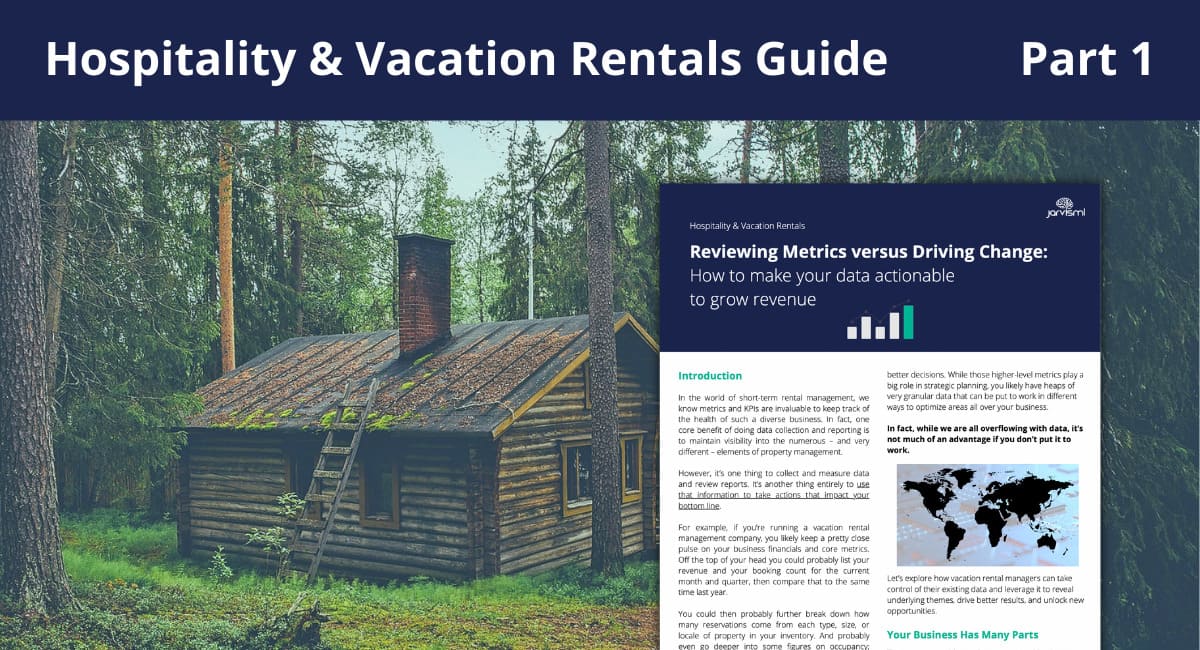This is post number one of our two-part blog series – both are pieces of our Guide titled: “Reviewing Metrics versus Driving Change: How to make your data actionable to grow revenue”. We explore how to make better use – real actionable use – out of the data you have.
Vacation rental management businesses have a high number of very different operations going on at all times. The only way to keep up is by tracking it all. The historical standard is to simply review your metrics and reports periodically, summarizing the health of your business.
But wait, there’s more …that you can do! And I mean actually “do”. We’re here to provide actionable steps towards putting that data to work to improve your business.
This post – part number one – looks at the diverse business, what data is collected and its value, and narrows the topic down to your guest acquisition funnel.
Introduction
In the world of short-term rental management, we know metrics and KPIs are invaluable to keep track of the health of such a diverse business. In fact, one core benefit of doing data collection and reporting is to maintain visibility into the numerous – and very different – elements of property management.
However, it’s one thing to collect and measure data and review reports. It’s another thing entirely to use that information to take actions that impact your bottom line.
For example, if you’re running a vacation rental management company, you likely keep a pretty close pulse on your business financials and core metrics. Off the top of your head you could probably list your revenue and your booking count for the current month and quarter, then compare that to the same time last year.
You could then probably further break down how many reservations come from each type, size, or locale of property in your inventory. And probably even go deeper into some figures on occupancy; where your guests are visiting from; and even website traffic trends. These figures help you understand the health of the business. They allow you to act quickly and make better decisions.
While those higher-level metrics play a big role in strategic planning, you likely have heaps of very granular data that can be put to work in different ways to optimize areas all over your business. In fact, while we are all overflowing with data, it’s not much of an advantage if you don’t put it to work.
Let’s explore how vacation rental managers can take control of their existing data and leverage it to reveal underlying themes, drive better results, and unlock new opportunities.
Your Business Has Many Parts
There are many sides to short-term rental businesses. And in each area, there are opportunities to collect and deploy data. One enormous element is the on-site housekeeping, maintenance, stocking, and operations. Having reports on the many elements – for example, the cost of shampoo, the number of tasks performed per property, or how many items go missing each month – will give you power as a business owner.
Having visibility into this side, you may find areas of high inefficiency, problematic processes, or high-performing employees that can train others. Places to take action!
Another side of the business focuses on winning and retaining new homeowners and property inventory. Understanding trends on the changing count of your listings per sub-region – or on the cost of finding and onboarding a new owner – can help you make smarter decisions about reinvesting or de-prioritizing.
The same goes with customer support and client services: tracking the number of issues, types of complaints, and the quality of support your team provides can help to identify areas to actually prevent problems before they happen and improve customer experience!
For example: if check-ins cause the most issues due to lockboxes or key drop-offs, perhaps a different method – like a smart lock – can be tested. Given so many areas of a short-term rental business – learning from your data can help you meaningfully improve your business.
An Actionable Example
Let’s look at a great example of using data to make important changes to your business. You have been collecting data on each property’s maintenance tickets (for example: the types of issues that arise, how long they take, and how expensive they are to resolve) for a couple of years.
After hearing something in the field about some persistent issues, you decide to run an analysis on problematic listings based on the types and depth of tickets. In this case, you find that a few properties in your inventory are actually costing you quite a lot annually – lowering the net operating income. They have recurring issues with some amenity or infrastructure that requires maintenance, frustrates guests, and wastes time across your whole team. (Pilot light goes out? Spa motor issue? HVAC inconsistencies?)
Maybe these homes are generating negative reviews as well. (And further layering-on your reservation data may indicate they are not getting bookings as frequently either!)
The action? Well quite simply: you can off-board some of that costly inventory and directly increase profitability. That’s a high leverage decision that impacts many areas of your company. And while it can be a tough decision to lose an owner that you have a good relationship with, it can also be a big win for the business.
This type of decision is larger, we’ll say. It impacts your business in a meaningful way – but can be one-off and require some deliberation and even group decision making. However, there are other examples where information about your property listings or website behavior can be put to work in a way that happens automatically and works continuously behind the scenes.
There’s a diversity of applicable ways to utilize the data you are (or could be) collecting! The focus of the following discussion is on the acquisition of new guests and repeat bookings. This is an area where an enormous amount of data can be generated: for marketing campaigns, sales conversions, website experience, and the transactions and expenses that go into these channels.
Guest Acquisition
The more data you have about your customer base, the more power you have to grow. Using an OTA like Airbnb or Vrbo to manage new customer acquisition is a necessary channel for many businesses. However, if you drive traffic to your own website – via search engine optimization (SEO), paid ads, or other campaigns – you’re able to collect an abundance of information to learn and improve this arm of the business operation.
You’ll own the data, not the OTA. When you control your booking flow on your website, you can really start to understand what is working or not in your guest experience. And then make tweaks to improve your conversion funnel.
Marketing campaigns are a great place to start:
- Which ads are generating quality leads?
- Do the guests receiving promotion emails turn into paid reservations? What changes in email format or personalization have increased revenue?
- What does your conversion data for marketing campaigns say about the messaging, pricing, or properties you display?
Website experience is another related place that can be optimized by analysis:
- When prospective guests land on your site, what search filters are they using for your property listings? Are they running advanced searches?
- Do they arrive at property detail pages regularly? Does their time-spent-per-page correlate to their likelihood of booking?
- What scenarios or types of leads will “abandon their cart” – where the reservation is never finalized?
By using email marketing tools, marketing automation, website analytics integrations, advertising platforms, and more… you have access to the data that can answer these types of questions. You have what you need to learn, take action, and improve.
Further – beyond the marketing and web systems – you also can take a look at your guest profiles. That information is likely stored in the property management software, customer relationship management tool (CRM), or booking system (perhaps even your ticketing tool.) Each guest has a profile: of past bookings, of reservation history and timelines, of property preferences, of what price they paid for each stay, method of payment, and even their communications and interactions with your brand.
And you already own that as well.
Is there a way to improve your campaigns, conversion rates, and guest booking experience based on the data you’re collecting?
Absolutely. But how?
Read Part 2 to dig into the insights that drive action.





